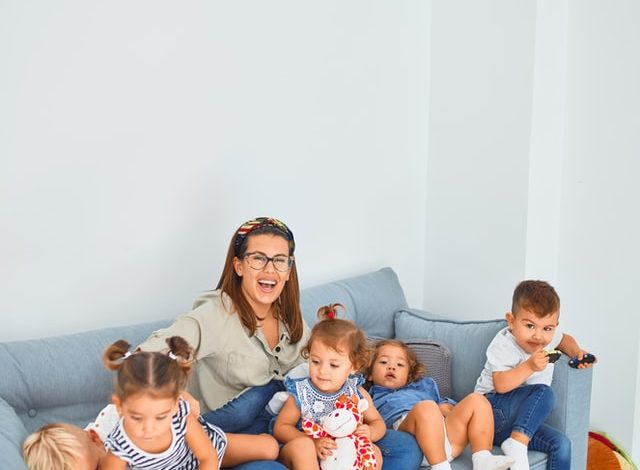Anxiety in children: symptoms, types, causes, treatment

Anxiety in children: symptoms, types, causes, treatment
Just like adults, children go through mental states that are not their type. You may notice some changes in your child’s behavior, behavior and expression that may be due to his anxiety. Fear in children causes, symptoms and treatment methods.
What is fear in children?
It is normal for children to go through a certain type of fear and it is a natural development at any stage of their development, but if this fear interferes with his life and studies here, it is worth turning to specialists.
For example, children between the ages of 6 months and 3 years can develop a type of anxiety disorder called . Separation anxiety : It is also common for children to suffer from a certain type of phobia before going to school, as a child’s fear can also develop with some accidents and changes in their lives.
Types of anxiety in children
There are several different types of anxiety your child may have, including:
Symptoms of anxiety in children
The question here is, if your child doesn’t talk about his feelings, how do you know he has an anxiety disorder so you can help him? There are signs that your child has anxiety, including:
- Unusually nervous and irritable.
- Feeling anxious and worried.
- Inattention and distracted focus.
- She constantly complained of physical symptoms such as headaches or stomachaches.
- Isolation and avoidance of meetings and gatherings.
- Frequent outbursts of anger.
- Cry for no reason.
- He refused to go to school.
- Being nervous about anything before school, like your clothes, shoes, and hair.
- Agitation after school about homework.
- Ask him to help you do the things he would normally do on his own.
- Suddenly fear of the dark, dogs, injections, germs…and so on.
- Difficulty falling asleep without a parent next to him.
- Unfriendly dealing with parents.
Causes of anxiety in children
There are several possible causes for your child’s anxiety, such as:
- A child can inherit anxiety genes from their parents if they have a family history of anxiety disorders.
- Imbalances and imbalances in brain chemistry (neurotransmitters) can lead to anxiety and depression in a child.
- Certain situations and events that a child experiences can cause anxiety about illness, such as the death of a relative, a disagreement between parents, frequent moves to a new home or school, a serious illness, a particular incident at school that exposed them to bullying, or they have difficulty with exams. They are subjected to violence and abuse.
- It is also possible for a child to develop fear and anxiety when taught and raised by people with the same type of anxiety disorder.
Diagnosing anxiety in children
If you notice your child’s previous symptoms and they get worse over time so that they begin to interfere with his daily activities and school performance, you should see a psychiatrist for an evaluation of your child’s condition, where a specialist looks for and asks about symptoms. Hesitates and will talk to the child about his feelings and fears. And when exactly do you feel it?
Children who always have physical symptoms of anxiety should have regular medical exams to ensure that these symptoms are not caused by any other cause.
Treating anxiety in children
The treatment for anxiety here depends on the child’s condition, age, and cause of concern. Treatment includes:
Talk to the doctor
Through it, the child can express what he feels and what frightens him. The doctor helps him to get rid of his fears and gives him the means to overcome them.
Cognitive behavioral therapy
Cognitive behavioral therapy also depends on talking with the child, but by trying to make him face his fears and convince him that avoiding what causes him fear and anxiety will make his problem worse and teach him ways to coexist and overcome his fear, and this treatment is also applied to parents to teach them how to respond and how to deal with the sounds of anxiety attacks when their children.
Anxiety drugs
A doctor may prescribe anti-anxiety medication for a child if their condition becomes severe and cannot be controlled with CBT, but this should be done by a child psychologist, rather than a psychiatrist or behavior modification specialist.
How do I deal with fear with my child?
There are many tips and steps that you can follow to properly deal with anxiety in children, such as:
- Teach your child how to recognize their anxiety symptoms on their own so that they are the first to know they are having an anxiety attack.
- Encourage your child to face and control his fears and to seek help when he needs it.
- Following a regular daily routine can help calm him if he has an accident or a specific situation that has frightened him.
- If a particular change is planned, such as moving to another apartment, you need to talk to your child ahead of time and prepare them morally for that change and include them in that planning.
- Distraction and distraction can help your child, for example if he has a doctor appointment that makes him feel scared, you can bring a toy that helps him forget his worries so that the appointment goes safely.
Finally, you should know that anxiety is normal in children and you should not become anxious and irritable when your child is going through an anxiety attack, but rather calm down and control your emotions so that your child gets strength. And the courage to overcome his fears and if you have any questions there is someone you can turn to. Our doctors are there for you.
.



